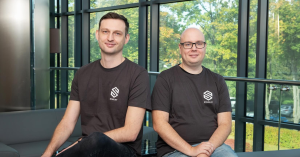Curious about the AI boom, The Recursive wasted no time exploring how artificial intelligence is redefining the future of business by improving software product development, marketing, enterprise automation, and venture capital, while redefining professions such as lawyer, oncologist, and HR rep. But AI is also poised to revolutionize the way we work. In this article, we explore six positive AI visions for the future of work.
In the early 20th century, British economist John Maynard Keynes envisioned that by 2028, technology would set humans free from work-centered lives, taking over the unsafe, repetitive, and tiresome parts of our jobs and giving us more time to pursue our personal interests. We would reap the gains of science advancement and compound interest, finally stop worrying about money, and live well. We’re not there yet, but the latest AI commercialization cycle hints that we are close enough, that our ability to train computers has reached a critical point where the benefits can be democratically distributed around the world, across social backgrounds and professions.
AI-enabled labor does not come without negative consequences, which should be treated seriously. Yet, should we manage to avoid the most pessimistic scenarios, there are at least 6 positive AI visions for the future of work that highlight the transformational power of AI on the labour market: shared economic prosperity, realigned companies, flexible labor markets, human-centric AI, fulfilling jobs, and civic empowerment and human flourishing. In this article, we delve into each of these visions, exploring the potential ways in which AI can shape a brighter future for work.
Shared economic prosperity
AI is increasingly seen as an engine of productivity and economic growth. AI is expected to lead to the creation of new products and services, as well as markets and industries, therefore generating new revenue streams.
According to a study by McKinsey, the economic potential of generative AI reaches trillions of dollars. AI could add the equivalent of $2.6 trillion to $4.4 trillion annually. The upper threshold is more than the UK’s current GDP in 2021, of $3.1 trillion.
AI has the potential to contribute to economic prosperity by increasing productivity and accelerating innovation. Generative AI, for instance, delivers value across key four areas: marketing and sales – by generating creative content, software engineering – by drafting computer code based on natural-language prompts, and customer operations – by automating interactions, and R&D – by accelerating processes and time to market. As AI automates routine tasks, it can free up people to focus on higher-value activities, leading to increased productivity and economic growth.
Moreover, the benefits derived from AI can be shared more equitably by ensuring that the gains are not concentrated solely in the hands of a privileged few. AI democratization, powered by the increasing availability of AI knowledge and tools around the world, promises to offer new opportunities for underprivileged communities that improve their economic prospects.
In Central and Eastern Europe, Bulgaria is seizing the opportunity presented by AI with the recently formed Institute for Computer Science, Artificial Intelligence and Technology (INSAIT), which aims to transform the local economy into a competitive high-tech one.
Realigned companies
AI can also enable companies to realign their operations and strategies to adapt to the evolving needs of the future of work. This realignment can result in more agile, competitive, and resilient organizations that thrive in the digital age.
By integrating AI technologies, organizations can optimize their processes, make data-driven decisions, and enhance efficiency. AI-powered analytics can provide valuable insights into customer behavior, market trends, and operational inefficiencies, enabling companies to streamline their operations and deliver better products and services.
In Central and Eastern Europe, for instance, conversational chatbots such as Poland-based VoiceLab are focused on enhancing customer support as well as analyzing conversation to learn from best practices or mistakes and thus boost sales efficiency. Others such as Prague-based Product Fruits help companies create seamless onboarding processes by providing a no-code interface and easy integrations.
Flexible labor markets
Organizations seem to agree on one point: the future of work will be characterized by more flexibility and work-life balance. AI technologies can facilitate this flexibility in more than one way.
AI tools can, for instance, better match workers with job opportunities, regardless of geographical constraints, by leveraging remote work and digital platforms. Gig economy platforms powered by AI, such as Gigmos, can connect workers with short-term or project-based work, providing flexibility and opportunities for individuals to leverage their skills and expertise in diverse domains.
AI could also enable gig economy businesses to provide more targeted and personalized services. Platforms such as AirBnb could delight users with more relevant suggestions based on their preferences, both stated and derived from their interactions. It could then lead to increased customer satisfaction, loyalty, and higher earnings.
Finally, having an AI assistant by one’s side, freelancers can use it to optimize their work, reduce inefficiencies, and improve communications with clients. They could save time to pursue multiple gigs and diversify their work.
Human-centric AI
An essential aspect of an AI-powered future of work is ensuring that AI systems prioritize human well-being and empowerment. Human-centric AI is designed with ethical considerations, transparency, and accountability in mind.
Therefore, AI systems should augment human capabilities, rather than diminish them. It should help enhance decision-making processes by reducing bias and discrimination, instead of perpetuating it. As AI could allow for a magnified use of personal information, it should also protect privacy above profits and public interests.
Such concerns echoed through the increasing demands for AI governance and regulation. Recently, European lawmakers voted in favor of an EU AI Act that prohibits AI systems with an unacceptable level of risk to people’s safety.
Fulfilling jobs
According to a survey, 92% of post-COVID job switchers are seeking more fulfilling jobs, i.e. that align with their passions and motivations. Examples of values and work motivators that employees seek today are purpose, development, flexibility, transparency, work-life balance, and compensation.
AI has plenty of potential to make jobs more fulfilling and meaningful. By automating repetitive and mundane tasks, AI can save people time to engage in work that aligns with their development trajectories, interests, and aspirations. It can leave room for employees to explore skills such as creative problem-solving, critical thinking, and complex decision-making, which are more likely to lead to new career and business opportunities.
Furthermore, AI can provide personalized learning and development opportunities, fostering continuous growth and enabling workers to adapt to changing job requirements.
Media is one of the industries where AI is turning the traditional formula on its head. Challenges aside, a media space where AI is used ethically and responsibly can help journalists and entertainers ditch tedious and time-consuming tasks and spend more time on creative activities.
Civic empowerment and human flourishing
Last but not least, AI could have a much vaster contribution than adding value to individual jobs and businesses. If used responsibly, artificial intelligence could empower communities and strengthen democracy.
First, AI can democratize access to education and information across the world, bridging economic and social inequalities. Around the world, education institutions are already heavily relying on AI, whether through curated tutoring lessons or to monitor classroom progress. Instead of replacing teachers and trainers, AI is likely to enhance their ability to create unique and high-quality courses and lessons. One example in Central and Eastern Europe is Ascendia’s LIVRESQ tool for teachers which incorporates Azure OpenAI GTP-4 technology.
By increasing access to information, AI-powered tools can also make it easier for citizens to participate in politics, by accessing government data and making informed decisions. Through AI-powered platforms and tools, citizens can further engage in collaborative decision-making processes, voice their concerns, and influence policy discussions.
None of these positive AI visions for the future of work tells the whole story. Yet by taking proactive steps to address the challenges associated with AI adoption, while focusing on enabling its application for the wider good, we can create a future where AI augments human capabilities, fosters economic growth, and promotes the well-being and empowerment of individuals and communities.








